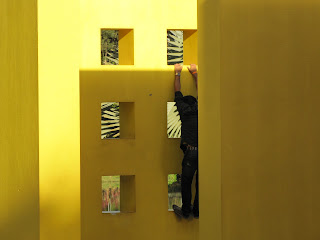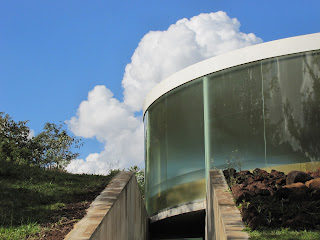Ele
lê para ser lido pelo texto que lê.
-- Affonso
Romano de Sant’Anna
Saturday, July 28, 2012
Saturday, July 7, 2012
Inhotim Images -- Artists' Works
John Ahearn and Rigoberto Torres: "Abre a Porta" (Open the Door) and "Rodoviária de Brumadinho" (Brumadinho Bus Station)
Olafur Eliasson: "Viewing Machine"
Jorge Macchi: "Piscina" (Swimming Pool)
Jarbas Lopes: Troca-Troca (Switcheroo)
Zhang Huan: (didn't note the title of this piece)
Tunga: Untitled
Tunga: "True Rouge"
Adriana Varejão: “Linda
do Rosário”, “Passarinhos -- de Inhotim
a Demini”, and “Panacea Phantastica”
Hélio
Oiticica: "Invenção da cor, Penetrável Magic Square # 5, De
Luxe" (Invention of Color, Penetrable Magic Square #5, Deluxe)
Yayoi Kusama: "Narcissus Garden Inhotim"
Friday, July 6, 2012
Wednesday, June 27, 2012
Saturday, June 23, 2012
Culture and Sustainability at Rio+20
I made the trek to relatively unfamiliar Gamboa yesterday to attend a dialogue on creativity and sustainability. Unfortunately, the two people I had wanted to hear from, Bia Lessa, who designed and directed the Humanidades 2012 installation that has received at least a couple of hundred thousand visitors at the Copacabana Fort, and Heloisa Buarque de Hollanda, a literary and cultural critic and mediator who I've come to rely on as a very helpful guide for contemporary Brazilian poetry, both canceled their appearance. The rest of the panel, though not of direct interest to my research, might have been enough to hold me, but the scene for the dialogue was just troubling enough that I decided at the last instant that I didn't want to be a part of it, and slipped out before the first speaker got started. I became distinctly aware of center/periphery or big-house/slave-quarters opposition and hierarchy in the larger context of this dialogue, in its production and relationship with the other events happening in the space, the so-called Galpão da Cidadania, or Citizen Warehouse, a freshly renovated events space that is part of the city's revitalization of the long decaying port area, which includes the removal of homes and families. This dialogue, part of series called "European Union - Brazil Sectoral Dialogues) was on the second-floor, in a glassed in, air conditioned space, registration and credentials carefully managed by a friendly contingent of elegantly dressed young women, "de boa aparência", and introduced by a highly made-up woman in business attire who spoke in the carefully trained, excitedly articulated voice of a newscaster. The moderator then re-introduced the speakers and described the format for the questions to follow, which would only be taken virtually. That is, we could submit questions via mobile internet device, and vote via mobile internet device which questions the speakers should respond to, but we would not, seemingly, be able to ask a question by live voice and presence. Meanwhile, downstairs, in an open, non-air-conditioned and laxly monitored space, representatives of Indigenous and Afro-Brazilian communities congregated to discuss environmental justice claims. At one point, a group of Indians knelt together before the forum to sing together what seemed to be both a prayer and a denunciation of the environmental degradation witnessed in their territory. Around the rest of the building there were ethnographic and folk arts exhibits dedicated to Brazil's regional and ethnic diversity. Outside, a large group of Landless activists marched past, and the private security personnel closed and padlocked shut the large gated entrance to the building. Nobody was allowed to leave until the march was well out of sight.
Wednesday, June 20, 2012
Subscribe to:
Posts (Atom)

















































